高考英语单项填空 [上下学期通用]
图片预览
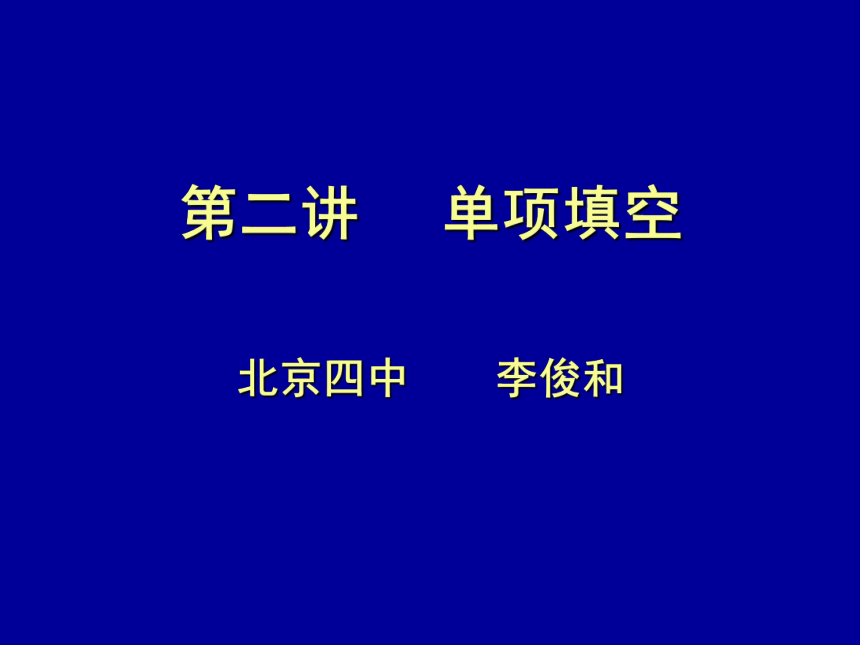

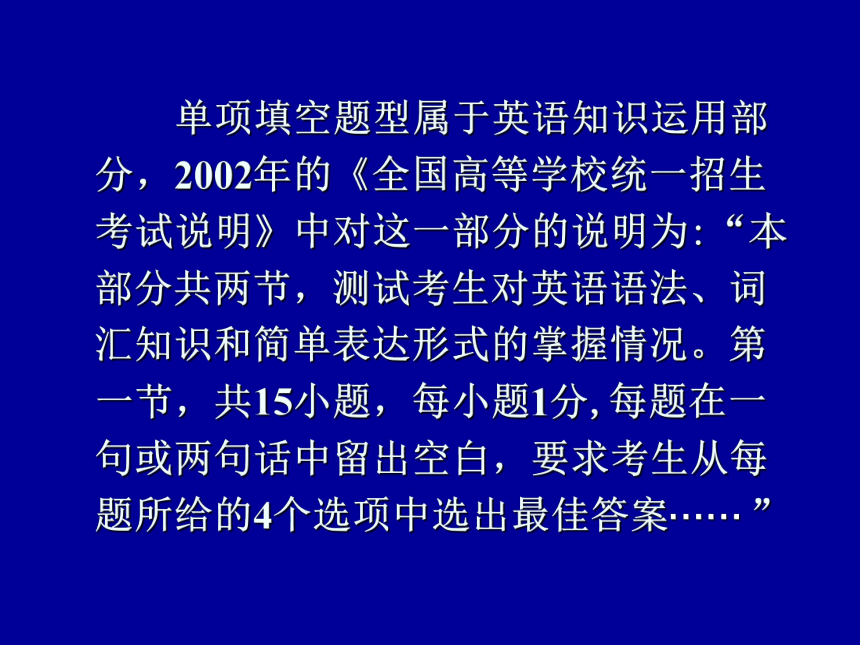
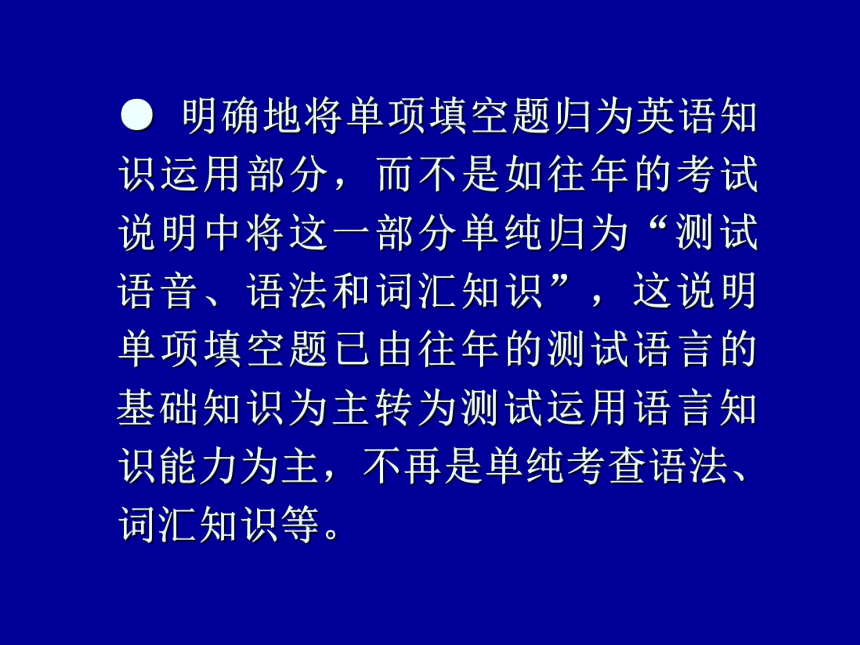
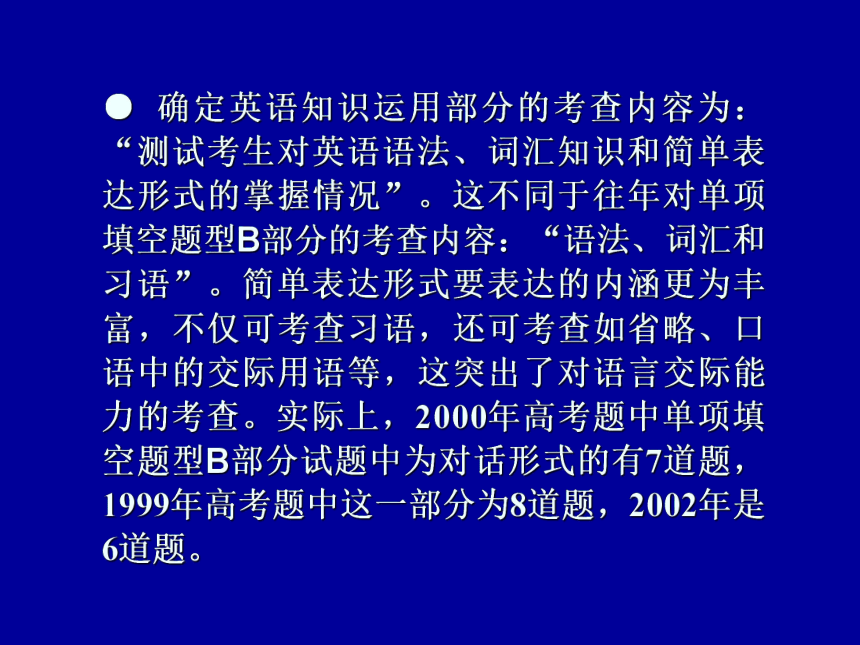
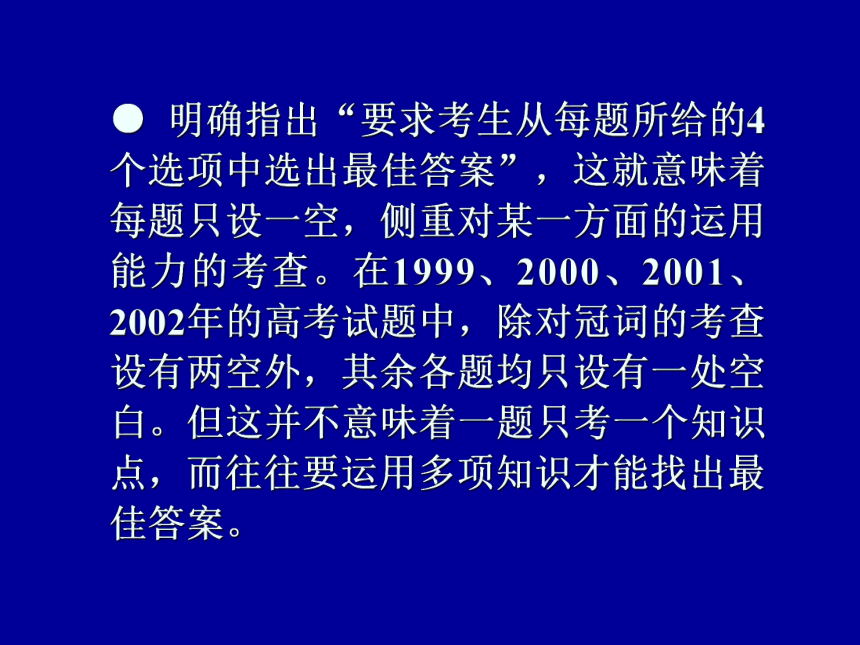
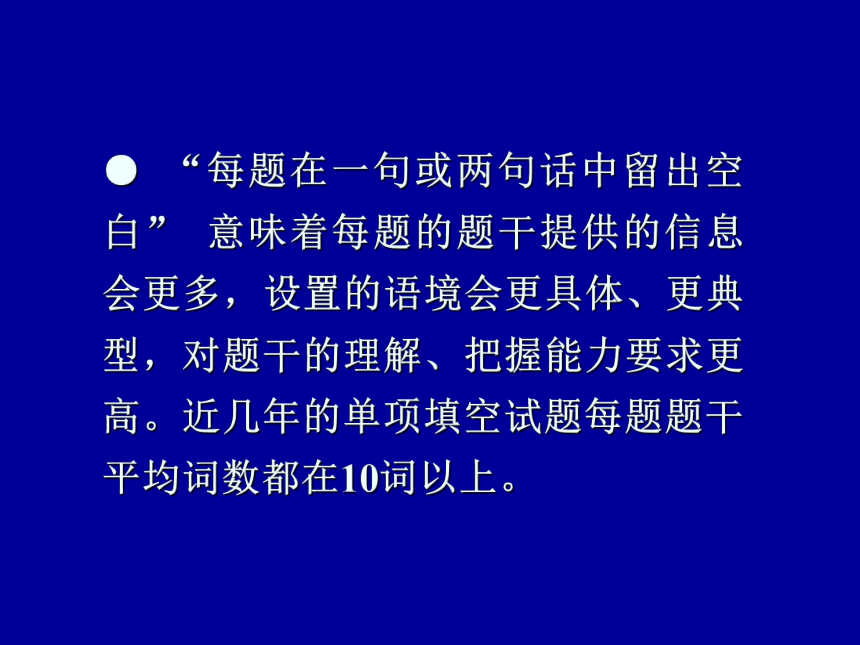
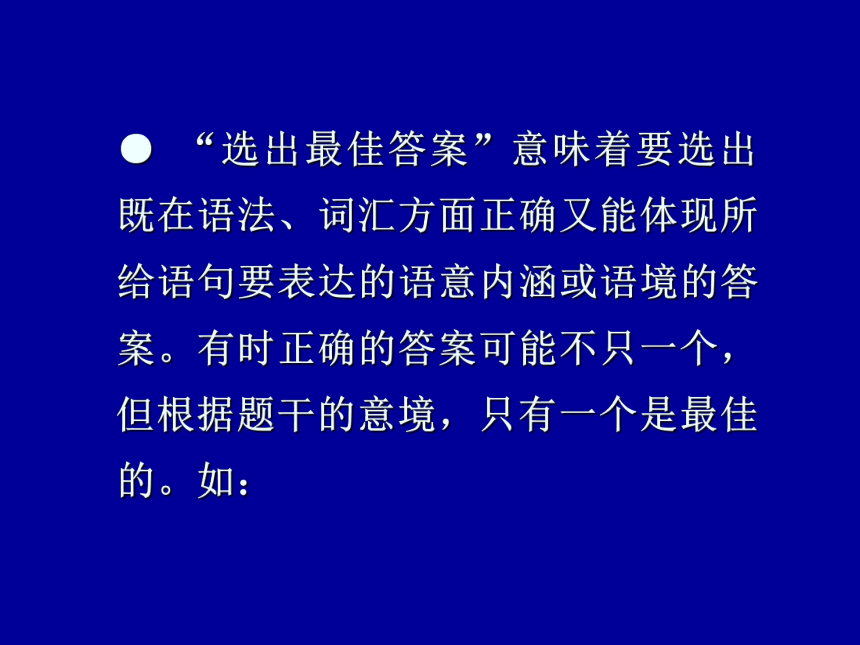
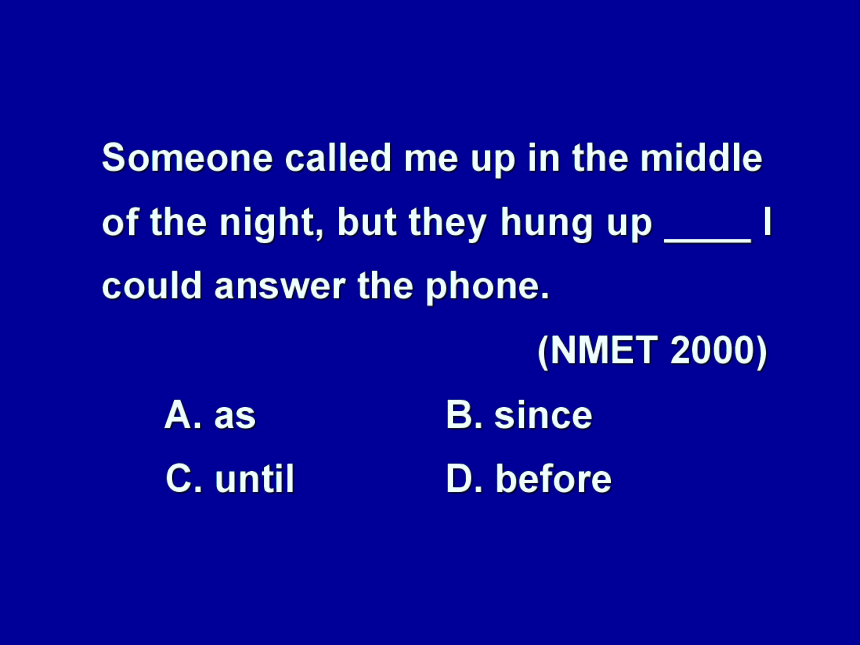
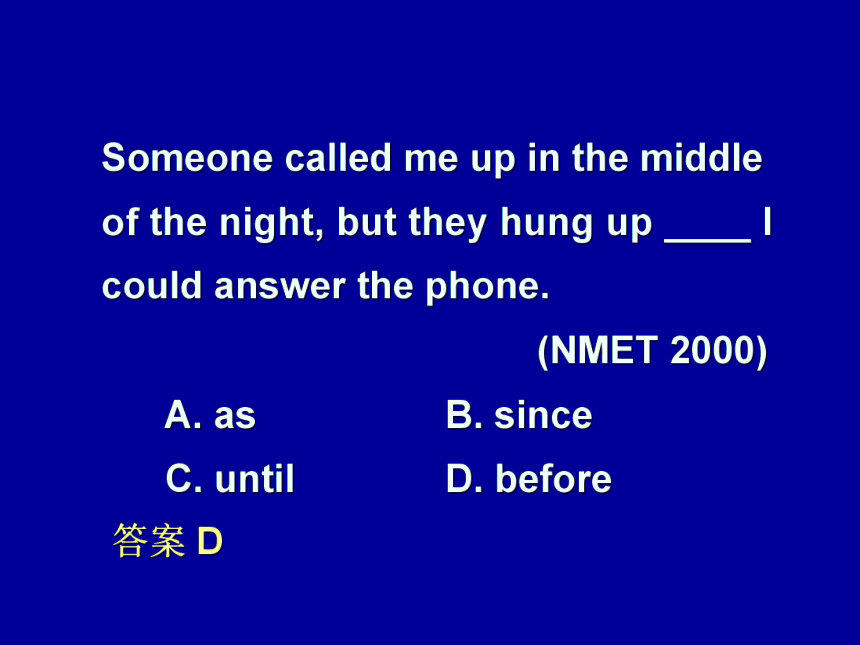
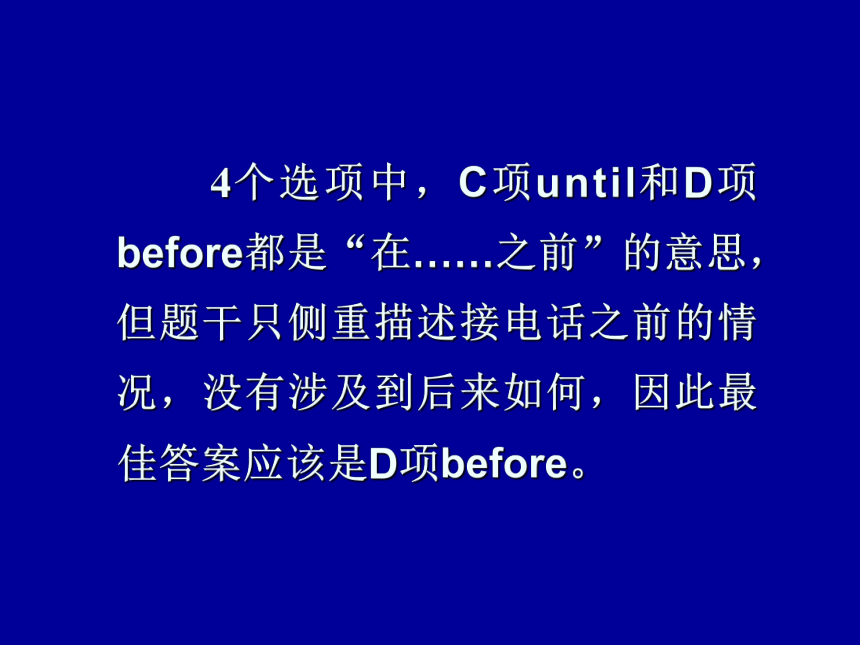

文档简介
课件71张PPT。第二讲 单项填空
北京四中 李俊和一、题型介绍 单项填空题型属于英语知识运用部分,2002年的《全国高等学校统一招生考试说明》中对这一部分的说明为:“本部分共两节,测试考生对英语语法、词汇知识和简单表达形式的掌握情况。第一节,共15小题,每小题1分,每题在一句或两句话中留出空白,要求考生从每题所给的4个选项中选出最佳答案 ” ……● 明确地将单项填空题归为英语知识运用部分,而不是如往年的考试说明中将这一部分单纯归为“测试语音、语法和词汇知识”,这说明单项填空题已由往年的测试语言的基础知识为主转为测试运用语言知识能力为主,不再是单纯考查语法、词汇知识等。● 确定英语知识运用部分的考查内容为:“测试考生对英语语法、词汇知识和简单表达形式的掌握情况”。这不同于往年对单项填空题型B部分的考查内容:“语法、词汇和习语”。简单表达形式要表达的内涵更为丰富,不仅可考查习语,还可考查如省略、口语中的交际用语等,这突出了对语言交际能力的考查。实际上,2000年高考题中单项填空题型B部分试题中为对话形式的有7道题,1999年高考题中这一部分为8道题,2002年是6道题。● 明确指出“要求考生从每题所给的4个选项中选出最佳答案”,这就意味着每题只设一空,侧重对某一方面的运用能力的考查。在1999、2000、2001、2002年的高考试题中,除对冠词的考查设有两空外,其余各题均只设有一处空白。但这并不意味着一题只考一个知识点,而往往要运用多项知识才能找出最佳答案。● “每题在一句或两句话中留出空白” 意味着每题的题干提供的信息会更多,设置的语境会更具体、更典型,对题干的理解、把握能力要求更高。近几年的单项填空试题每题题干平均词数都在10词以上。● “选出最佳答案”意味着要选出既在语法、词汇方面正确又能体现所给语句要表达的语意内涵或语境的答案。有时正确的答案可能不只一个,但根据题干的意境,只有一个是最佳的。如:Someone called me up in the middle of the night, but they hung up ____ I could answer the phone.
(NMET 2000)
A. as B. since
C. until D. beforeSomeone called me up in the middle of the night, but they hung up ____ I could answer the phone.
(NMET 2000)
A. as B. since
C. until D. before
答案 D 4个选项中,C项until和D项before都是“在……之前”的意思,但题干只侧重描述接电话之前的情况,没有涉及到后来如何,因此最佳答案应该是D项before。二、精髓提炼(一)分析题干与选项的语意与语境 把握了具体语意和语境,就能灵活恰当地运用相关知识,解答该题。例1 I don’t think I’ll need any money
but I’ll bring some ________.
(NMET 2002)
A. at last B. in case
C. once again D. in time例1 I don’t think I’ll need any money
but I’ll bring some ________.
(NMET 2002)
A. at last B. in case
C. once again D. in time
答案 B 例2 — Do you remember _____ he
came?
— Yes, I do. He came by car.
(NMET 1994)
A. how B. when
C. that D. if例2 — Do you remember _____ he
came?
— Yes, I do. He came by car.
(NMET 1994)
A. how B. when
C. that D. if
答案 A 例3 ______ is a fact that English is
being accepted as an
international language.
(NMET 1995)
A. There B. This
C. That D. It例3 ______ is a fact that English is
being accepted as an
international language.
(NMET 1995)
A. There B. This
C. That D. It
答案 D (二)分析题干与选项的特定语境 有些试题的语境比较特殊,在解答过程中,不仅要对选项中的词语意义有正确理解,对句子结构需要的语法知识有明确了解,而且还要弄明白题干句子提供的特殊的语境条件,据此才能选出既能在语法上又能在语境意义上满足句子需要的唯一最佳选项。例4 — ______ my glasses?
— Yes, I saw them on your bed a
minute ago. (NMET 1996)
A. Do you see
B. Had you seen
C. Would you see
D. Have you seen例4 — ______ my glasses?
— Yes, I saw them on your bed a
minute ago. (NMET 1996)
A. Do you see
B. Had you seen
C. Would you see
D. Have you seen
答案 D 例5 — Who is Jerry Cooper?
— ________ him yet? I saw you
shaking hands with him at the
meeting.
(NMET 1997)
A. Don’t you meet
B. Hadn’t you met
C. Didn’t you meet
D. Haven’t you met例5 — Who is Jerry Cooper?
— ________ him yet? I saw you
shaking hands with him at the
meeting.
(NMET 1997)
A. Don’t you meet
B. Hadn’t you met
C. Didn’t you meet
D. Haven’t you met
答案 D 例6 — When can I come for the
photos? I need them
tomorrow afternoon.
— They________be ready by
12:00. (NMET 1998)
A. can B. should
C. might D. need例6 — When can I come for the
photos? I need them
tomorrow afternoon.
— They________be ready by
12:00. (NMET 1998)
A. can B. should
C. might D. need
答案 B A. mustn’t B. can’t
C. needn’t D. won’t 例7 — Will you stay for lunch?
— Sorry, I ________. My brother
is coming to see me.
(NMET 1999) A. mustn’t B. can’t
C. needn’t D. won’t
答案 B 例7 — Will you stay for lunch?
— Sorry, I ________. My brother
is coming to see me.
(NMET 1999)例8 Few pleasures can equal ____
of a cool drink on a hot day.
(NMET 1999)
A. some B. that
C. any D. those例8 Few pleasures can equal ____
of a cool drink on a hot day.
(NMET 1999)
A. some B. that
C. any D. those
答案 B (三)把握语言的情景交际功能
语言的功能就是要为人们间的交流服务,解题时要根据不同的时间、地点和场合,特定的文化背景,人物的身份性格和情绪等来确定答案,这需要理解题干句子的语境条件,同时理解各选项中的词语意思、应用场合等。 例9 — Do you think I could borrow
your dictionary?
— Yes, ________. (NMET 1997)
A. you may borrow
B. you could
C. help yourself
D. go on 例9 — Do you think I could borrow
your dictionary?
— Yes, ________. (NMET 1997)
A. you may borrow
B. you could
C. help yourself
D. go on
答案 C 例10 — Can I get you a cup of tea?
— _______.
(NMET 1998)
A. You can, please
B. With pleasure
C. That’s very nice of you D. Thank you for the tea 例10 — Can I get you a cup of tea?
— _______.
(NMET 1998)
A. You can, please
B. With pleasure
C. That’s very nice of you
D. Thank you for the tea
答案 C 例11 — I had a really good weekend
at my uncle’s.
— ________. (NMET 1999)
A. Oh, that’s very nice of you
B. Congratulations
C. It’s a pleasure
D. Oh, I’m glad to hear that 例11 — I had a really good weekend
at my uncle’s.
— ________. (NMET 1999)
A. Oh, that’s very nice of you
B. Congratulations
C. It’s a pleasure
D. Oh, I’m glad to hear that
答案 D 例12 — Waiter!
— ________
— I can’t eat this. It’s too salty.
(NMET 2000)
A. Yes, sir? B. What?
C. All right? D. Pardon? 例12 — Waiter!
— ________
— I can’t eat this. It’s too salty.
(NMET 2000)
A. Yes, sir? B. What?
C. All right? D. Pardon?
答案 A (四)辨别英语词语间的用法差别或 搭配习惯
在解答关于词语辨析和固定搭配类试题时,在明确题干句子含义后,还必须理解各项词语的意义和搭配习惯,对于近似词语(形似或意近)还必须注意它们间意义和搭配的细微差别。 例13 She _____ his number in the
phone book to make sure that
she had got it right.
(NMET 1997)
A. looked up B. looked for
C. picked out D. picked up 例13 She _____ his number in the
phone book to make sure that
she had got it right.
(NMET 1997)
A. looked up B. looked for
C. picked out D. picked up
答案 A 例14 They _____ the train until it
disappeared in the distance.
(NMET 1998)
A. saw B. watched
C. noticed D. observed例14 They _____ the train until it
disappeared in the distance.
(NMET 1998)
A. saw B. watched
C. noticed D. observed
答案 B 例15 Let Harry play with your
toys as well, Clare —
you must learn to____.
(NMET 2000)
A. support B. care
C. spare D. share例15 Let Harry play with your
toys as well, Clare —
you must learn to____.
(NMET 2000)
A. support B. care
C. spare D. share
答案 D (五)语言基础知识的积累
平时学习中要注重多进行归纳、分析、比较。牢固的基础知识是解题的基础,没有掌握相关知识,能力再高也无用武之地。所有知识运用题都要涉及到相关基础知识。例16 He dropped the ____and broke it.
(NMET 1993)
A. cup of coffee
B. coffee’s cup
C. cup for the coffee
D. coffee cup例16 He dropped the ____and broke it.
(NMET 1993)
A. cup of coffee
B. coffee’s cup
C. cup for the coffee
D. coffee cup
答案 D A. a ; / B. the ; a
C. the ; the D. / ; the 例17 Many people agree that ____
knowledge of English is a must
in ____ international trade today.
(NMET 1996) A. a ; / B. the ; a
C. the ; the D. / ; the
答案 A 例17 Many people agree that ____
knowledge of English is a must
in ____ international trade today.
(NMET 1996)A. another B. other
C. more D. less 例18 — Have you finished your report
yet?
— No, I’ll finish in ____ten minutes.
(NMET 1995)A. another B. other
C. more D. less
答案 A 例18 — Have you finished your report
yet?
— No, I’ll finish in ____ten minutes.
(NMET 1995) 近年来单项填空题型对语言知识考查的特点为:
(1)内容覆盖面广,考查范围为大纲中列出的所有语法项目。
(2)重点突出,强调对动词用法的考查,每年的高考中都有相关试题,涉及如时态、语态、情态动词、动词词义辨析等方面数量都在5道题以上。 例19 The taxi driver often reminds
passengers to _____ their
belongings when they leave
the car. A. keep B. catch
C. hold D. take 答案 D 例19 The taxi driver often reminds
passengers to _____ their
belongings when they leave
the car. A. keep B. catch
C. hold D. take 例20 I wonder why Jenny ____ us
recently. We should have
heard from her by now.A. hasn’t written
B. doesn’t write
C. won’t write
D. hadn’t writtenA. hasn’t written
B. doesn’t write
C. won’t write
D. hadn’t written 答案 A例20 I wonder why Jenny ____ us
recently. We should have
heard from her by now.三、解题方法1. 可采用跟踪追击法,如 look forward ______ sth,可直接到选项中找to, 或者也可采用排斥法,另三个都不对,那么剩下的就是对的。 2. 仔细看题干,体会情景、说话人的感情,一个词也不能忽略。 3. 动词是考核的重点,包括动词的时态、非谓语动词、情态动词、被动语态和短语动词的词汇辩义。把动词作为考查的重点是合理的,因为动词是英语中最活跃的词类,是句子的核心成分。此外,英语动词的变化较多,形式颇为复杂,是英语学习的难点之一。考生在备考时应该在动词上多下功夫。4. 不要死抠语法理论,要注意惯用法和口语的灵活性。需要提及的是,间接考查语言运用的题还不限于突出语境、强调意义的试题。近几年的NMET中还包括了考查习惯表达方式(有人称为情景反应)的试题。这里所说的习惯表达方式不同于平常所说的习语和惯用法,专指在特定的交际场合,人们习惯使用的一些表达方式。 这些表达方式可能是句子,也可能是词组或者单词。例如,人们见面时习惯说“Hello”,分手时则说 “ Good-bye”,“See you”,“So long”等等。做这类试题,首先要弄懂所提供的是什么样的交际情景,再根据这个情景选择相应的表达方式。所以这类试题不仅仅测试英语语言知识,还间接测试英语语言运用能力。5. 先做容易题,后做难题,利用好暗示和所给语境,实在不会的,也要猜一个答案。四、提高措施1. 了解高考单项填空题的命题特点:
(1)题量大,语言点多, 内容涉及中学英语语法的各个方面,但紧扣了教学大纲和考试说明。
(2)动词用法在单项选择中占有突出地位, 如2000年20道选择题中,涉及动词的小题为9个,占这一大题总量的2/5强。
(3)重视语境的运用。语境常体现在一句话的前一部分或后一部分, 或是体现在对话的上下文之中。 (4)将语法规则放在上下文的对话中进行考查,突出了语法规则在实际生活中的运用。
(5)诱答性强。每道小题中的三个干扰项,常有一至二个选项难于排除,有可能诱导受试者选错答案。 2. 增强阅读能力。读懂读准句子是做好单项填空题的前提。只有句子读好了,才可能对要填什么词作出准确的判断。3. 学好英语语法的基本知识,但没必要死抠过多的细枝末节。 4. 掌握好惯用法和固定搭配,并明确考试说明中的易混词汇的辩析。如:raise /rise, accept /receive 和 win /beat。
北京四中 李俊和一、题型介绍 单项填空题型属于英语知识运用部分,2002年的《全国高等学校统一招生考试说明》中对这一部分的说明为:“本部分共两节,测试考生对英语语法、词汇知识和简单表达形式的掌握情况。第一节,共15小题,每小题1分,每题在一句或两句话中留出空白,要求考生从每题所给的4个选项中选出最佳答案 ” ……● 明确地将单项填空题归为英语知识运用部分,而不是如往年的考试说明中将这一部分单纯归为“测试语音、语法和词汇知识”,这说明单项填空题已由往年的测试语言的基础知识为主转为测试运用语言知识能力为主,不再是单纯考查语法、词汇知识等。● 确定英语知识运用部分的考查内容为:“测试考生对英语语法、词汇知识和简单表达形式的掌握情况”。这不同于往年对单项填空题型B部分的考查内容:“语法、词汇和习语”。简单表达形式要表达的内涵更为丰富,不仅可考查习语,还可考查如省略、口语中的交际用语等,这突出了对语言交际能力的考查。实际上,2000年高考题中单项填空题型B部分试题中为对话形式的有7道题,1999年高考题中这一部分为8道题,2002年是6道题。● 明确指出“要求考生从每题所给的4个选项中选出最佳答案”,这就意味着每题只设一空,侧重对某一方面的运用能力的考查。在1999、2000、2001、2002年的高考试题中,除对冠词的考查设有两空外,其余各题均只设有一处空白。但这并不意味着一题只考一个知识点,而往往要运用多项知识才能找出最佳答案。● “每题在一句或两句话中留出空白” 意味着每题的题干提供的信息会更多,设置的语境会更具体、更典型,对题干的理解、把握能力要求更高。近几年的单项填空试题每题题干平均词数都在10词以上。● “选出最佳答案”意味着要选出既在语法、词汇方面正确又能体现所给语句要表达的语意内涵或语境的答案。有时正确的答案可能不只一个,但根据题干的意境,只有一个是最佳的。如:Someone called me up in the middle of the night, but they hung up ____ I could answer the phone.
(NMET 2000)
A. as B. since
C. until D. beforeSomeone called me up in the middle of the night, but they hung up ____ I could answer the phone.
(NMET 2000)
A. as B. since
C. until D. before
答案 D 4个选项中,C项until和D项before都是“在……之前”的意思,但题干只侧重描述接电话之前的情况,没有涉及到后来如何,因此最佳答案应该是D项before。二、精髓提炼(一)分析题干与选项的语意与语境 把握了具体语意和语境,就能灵活恰当地运用相关知识,解答该题。例1 I don’t think I’ll need any money
but I’ll bring some ________.
(NMET 2002)
A. at last B. in case
C. once again D. in time例1 I don’t think I’ll need any money
but I’ll bring some ________.
(NMET 2002)
A. at last B. in case
C. once again D. in time
答案 B 例2 — Do you remember _____ he
came?
— Yes, I do. He came by car.
(NMET 1994)
A. how B. when
C. that D. if例2 — Do you remember _____ he
came?
— Yes, I do. He came by car.
(NMET 1994)
A. how B. when
C. that D. if
答案 A 例3 ______ is a fact that English is
being accepted as an
international language.
(NMET 1995)
A. There B. This
C. That D. It例3 ______ is a fact that English is
being accepted as an
international language.
(NMET 1995)
A. There B. This
C. That D. It
答案 D (二)分析题干与选项的特定语境 有些试题的语境比较特殊,在解答过程中,不仅要对选项中的词语意义有正确理解,对句子结构需要的语法知识有明确了解,而且还要弄明白题干句子提供的特殊的语境条件,据此才能选出既能在语法上又能在语境意义上满足句子需要的唯一最佳选项。例4 — ______ my glasses?
— Yes, I saw them on your bed a
minute ago. (NMET 1996)
A. Do you see
B. Had you seen
C. Would you see
D. Have you seen例4 — ______ my glasses?
— Yes, I saw them on your bed a
minute ago. (NMET 1996)
A. Do you see
B. Had you seen
C. Would you see
D. Have you seen
答案 D 例5 — Who is Jerry Cooper?
— ________ him yet? I saw you
shaking hands with him at the
meeting.
(NMET 1997)
A. Don’t you meet
B. Hadn’t you met
C. Didn’t you meet
D. Haven’t you met例5 — Who is Jerry Cooper?
— ________ him yet? I saw you
shaking hands with him at the
meeting.
(NMET 1997)
A. Don’t you meet
B. Hadn’t you met
C. Didn’t you meet
D. Haven’t you met
答案 D 例6 — When can I come for the
photos? I need them
tomorrow afternoon.
— They________be ready by
12:00. (NMET 1998)
A. can B. should
C. might D. need例6 — When can I come for the
photos? I need them
tomorrow afternoon.
— They________be ready by
12:00. (NMET 1998)
A. can B. should
C. might D. need
答案 B A. mustn’t B. can’t
C. needn’t D. won’t 例7 — Will you stay for lunch?
— Sorry, I ________. My brother
is coming to see me.
(NMET 1999) A. mustn’t B. can’t
C. needn’t D. won’t
答案 B 例7 — Will you stay for lunch?
— Sorry, I ________. My brother
is coming to see me.
(NMET 1999)例8 Few pleasures can equal ____
of a cool drink on a hot day.
(NMET 1999)
A. some B. that
C. any D. those例8 Few pleasures can equal ____
of a cool drink on a hot day.
(NMET 1999)
A. some B. that
C. any D. those
答案 B (三)把握语言的情景交际功能
语言的功能就是要为人们间的交流服务,解题时要根据不同的时间、地点和场合,特定的文化背景,人物的身份性格和情绪等来确定答案,这需要理解题干句子的语境条件,同时理解各选项中的词语意思、应用场合等。 例9 — Do you think I could borrow
your dictionary?
— Yes, ________. (NMET 1997)
A. you may borrow
B. you could
C. help yourself
D. go on 例9 — Do you think I could borrow
your dictionary?
— Yes, ________. (NMET 1997)
A. you may borrow
B. you could
C. help yourself
D. go on
答案 C 例10 — Can I get you a cup of tea?
— _______.
(NMET 1998)
A. You can, please
B. With pleasure
C. That’s very nice of you D. Thank you for the tea 例10 — Can I get you a cup of tea?
— _______.
(NMET 1998)
A. You can, please
B. With pleasure
C. That’s very nice of you
D. Thank you for the tea
答案 C 例11 — I had a really good weekend
at my uncle’s.
— ________. (NMET 1999)
A. Oh, that’s very nice of you
B. Congratulations
C. It’s a pleasure
D. Oh, I’m glad to hear that 例11 — I had a really good weekend
at my uncle’s.
— ________. (NMET 1999)
A. Oh, that’s very nice of you
B. Congratulations
C. It’s a pleasure
D. Oh, I’m glad to hear that
答案 D 例12 — Waiter!
— ________
— I can’t eat this. It’s too salty.
(NMET 2000)
A. Yes, sir? B. What?
C. All right? D. Pardon? 例12 — Waiter!
— ________
— I can’t eat this. It’s too salty.
(NMET 2000)
A. Yes, sir? B. What?
C. All right? D. Pardon?
答案 A (四)辨别英语词语间的用法差别或 搭配习惯
在解答关于词语辨析和固定搭配类试题时,在明确题干句子含义后,还必须理解各项词语的意义和搭配习惯,对于近似词语(形似或意近)还必须注意它们间意义和搭配的细微差别。 例13 She _____ his number in the
phone book to make sure that
she had got it right.
(NMET 1997)
A. looked up B. looked for
C. picked out D. picked up 例13 She _____ his number in the
phone book to make sure that
she had got it right.
(NMET 1997)
A. looked up B. looked for
C. picked out D. picked up
答案 A 例14 They _____ the train until it
disappeared in the distance.
(NMET 1998)
A. saw B. watched
C. noticed D. observed例14 They _____ the train until it
disappeared in the distance.
(NMET 1998)
A. saw B. watched
C. noticed D. observed
答案 B 例15 Let Harry play with your
toys as well, Clare —
you must learn to____.
(NMET 2000)
A. support B. care
C. spare D. share例15 Let Harry play with your
toys as well, Clare —
you must learn to____.
(NMET 2000)
A. support B. care
C. spare D. share
答案 D (五)语言基础知识的积累
平时学习中要注重多进行归纳、分析、比较。牢固的基础知识是解题的基础,没有掌握相关知识,能力再高也无用武之地。所有知识运用题都要涉及到相关基础知识。例16 He dropped the ____and broke it.
(NMET 1993)
A. cup of coffee
B. coffee’s cup
C. cup for the coffee
D. coffee cup例16 He dropped the ____and broke it.
(NMET 1993)
A. cup of coffee
B. coffee’s cup
C. cup for the coffee
D. coffee cup
答案 D A. a ; / B. the ; a
C. the ; the D. / ; the 例17 Many people agree that ____
knowledge of English is a must
in ____ international trade today.
(NMET 1996) A. a ; / B. the ; a
C. the ; the D. / ; the
答案 A 例17 Many people agree that ____
knowledge of English is a must
in ____ international trade today.
(NMET 1996)A. another B. other
C. more D. less 例18 — Have you finished your report
yet?
— No, I’ll finish in ____ten minutes.
(NMET 1995)A. another B. other
C. more D. less
答案 A 例18 — Have you finished your report
yet?
— No, I’ll finish in ____ten minutes.
(NMET 1995) 近年来单项填空题型对语言知识考查的特点为:
(1)内容覆盖面广,考查范围为大纲中列出的所有语法项目。
(2)重点突出,强调对动词用法的考查,每年的高考中都有相关试题,涉及如时态、语态、情态动词、动词词义辨析等方面数量都在5道题以上。 例19 The taxi driver often reminds
passengers to _____ their
belongings when they leave
the car. A. keep B. catch
C. hold D. take 答案 D 例19 The taxi driver often reminds
passengers to _____ their
belongings when they leave
the car. A. keep B. catch
C. hold D. take 例20 I wonder why Jenny ____ us
recently. We should have
heard from her by now.A. hasn’t written
B. doesn’t write
C. won’t write
D. hadn’t writtenA. hasn’t written
B. doesn’t write
C. won’t write
D. hadn’t written 答案 A例20 I wonder why Jenny ____ us
recently. We should have
heard from her by now.三、解题方法1. 可采用跟踪追击法,如 look forward ______ sth,可直接到选项中找to, 或者也可采用排斥法,另三个都不对,那么剩下的就是对的。 2. 仔细看题干,体会情景、说话人的感情,一个词也不能忽略。 3. 动词是考核的重点,包括动词的时态、非谓语动词、情态动词、被动语态和短语动词的词汇辩义。把动词作为考查的重点是合理的,因为动词是英语中最活跃的词类,是句子的核心成分。此外,英语动词的变化较多,形式颇为复杂,是英语学习的难点之一。考生在备考时应该在动词上多下功夫。4. 不要死抠语法理论,要注意惯用法和口语的灵活性。需要提及的是,间接考查语言运用的题还不限于突出语境、强调意义的试题。近几年的NMET中还包括了考查习惯表达方式(有人称为情景反应)的试题。这里所说的习惯表达方式不同于平常所说的习语和惯用法,专指在特定的交际场合,人们习惯使用的一些表达方式。 这些表达方式可能是句子,也可能是词组或者单词。例如,人们见面时习惯说“Hello”,分手时则说 “ Good-bye”,“See you”,“So long”等等。做这类试题,首先要弄懂所提供的是什么样的交际情景,再根据这个情景选择相应的表达方式。所以这类试题不仅仅测试英语语言知识,还间接测试英语语言运用能力。5. 先做容易题,后做难题,利用好暗示和所给语境,实在不会的,也要猜一个答案。四、提高措施1. 了解高考单项填空题的命题特点:
(1)题量大,语言点多, 内容涉及中学英语语法的各个方面,但紧扣了教学大纲和考试说明。
(2)动词用法在单项选择中占有突出地位, 如2000年20道选择题中,涉及动词的小题为9个,占这一大题总量的2/5强。
(3)重视语境的运用。语境常体现在一句话的前一部分或后一部分, 或是体现在对话的上下文之中。 (4)将语法规则放在上下文的对话中进行考查,突出了语法规则在实际生活中的运用。
(5)诱答性强。每道小题中的三个干扰项,常有一至二个选项难于排除,有可能诱导受试者选错答案。 2. 增强阅读能力。读懂读准句子是做好单项填空题的前提。只有句子读好了,才可能对要填什么词作出准确的判断。3. 学好英语语法的基本知识,但没必要死抠过多的细枝末节。 4. 掌握好惯用法和固定搭配,并明确考试说明中的易混词汇的辩析。如:raise /rise, accept /receive 和 win /beat。
